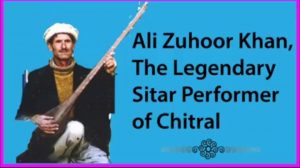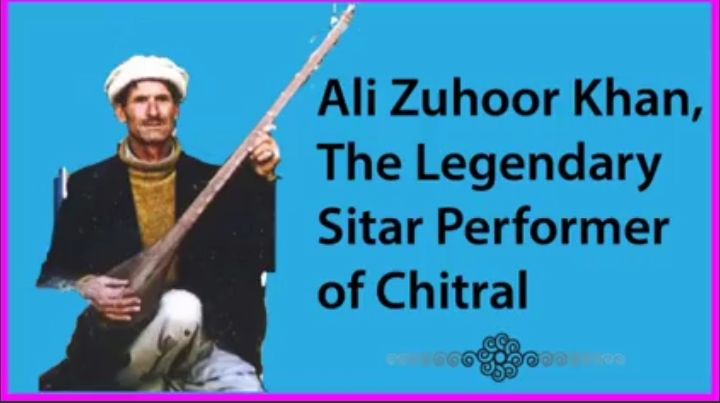Ali Zuhoor Khan, The Legendary Sitar Performer of Northern Pakistan.
Ali Zuhoor Khan, The Legendary Sitar Performer of Northern Pakistan.
By
Shams Uddin
Ali Zuhoor Khan (1926—1981) was a legendary sitar performer of Northern Pakistan. He was born in Chapali, a beautiful village of the Mastuj Tehsil. The village is the cradle of Kho cultural values i.e., poetry, folklores, folksongs, and folk music including the Chitrali sitar.

As a young man, Khan Sb must have been deeply inspired by the melody of the Chamarkhan Stream—overhung by willow and fragrant thorn bushes—flowing through the village, singing of golden oriole and starling in the orchard early in the morning, supplemented by the songs of snow cocks high on the mountains.
Overwhelmed by the melody of nature, the personality, and aptitude of the legendary Khan Sb was rightly defined in the formative phase of his life. His interpersonal qualities and musical skills were further groomed by the domineering cultural, and musical heritage of the village. As a down-to-earth young man, he must have assessed the suitability of his character before opting for sitar music that speaks voluminously about his softness and accuracy coupled with the sweetness of his feelings. It also sheds light on the turbulent situations that the fabulous performers must have undergone then.
When he started playing sitar, there were luminaries of classical sitar performers such as Shah Guli Zar Sb of Meragram and Mashaat Sb of Sonoghor. They both had reached the zenith of the art to play the instrument in a classical style. But he did not accept any influence from them notwithstanding his occasional visit to village Meragram to sit and listen to the sitar music of Shah Guli Zar. Instead, the only teacher from who he learned the basics of Chitrali sitar was Sifat Khan of Yarkhun, which he discloses in one of his audio interviews to Zar Wali Shah Zahid of Chapali, besides mentioning it in his famous song ‘Dilghubar’.
He had gifted skills and efficiency in playing the old or classical songs i.e. Shabdaraz, Hunzikwar, Ghalwar, Zhangwar, Dado dani, Arab Khano Dani, Krui Komoro, and so on. But what amazes the most is his ingenuity to pick the notes of the comparatively new songs. For instance, the song he plays in this video was composed in the post-1975 era. But he was very quick to pick and play it in such a perfect manner! Every note and each turn of the lyrics shows his creativity, innovation, and effective handling of the strings besides the best possible coordination between his running and striking fingers. The faster he plays the instrument, the cleaner and sweeter his music becomes. The sweetness of the pitch, loudness, and rhythmic accuracy of the string and frets could not be produced by anybody else except Khan Sb.
He was the pioneer of the style he produced. He parted way from the classical or old-style adopted by the sitar performance of his time or before him. But through his music ingenuity, he added new dimensions to sitar music, which is unparallel. As an accomplished artist, he modernized and popularized the music of Chitrali sitar and took it to the public/masses from the courtyard. But his modernized version is not completely divorced from the classic way of playing the instrument. It is perfect, smooth, accurate and he never misses out on a beat with the tabla or drummer, but when sometimes does so, it becomes highly stylistic on his part. His control of strings and frets is incredible.
Those who knew Khan sb say he was a person of calm demeanor and spoke very little. But when he spoke, he did so very softly and in compliance with the local cultural manners. He was open to experience, which was linked to independence in his thinking, active imagination, aesthetic sensibility, inner receptivity, preference to diversity, intellectual curiosity, and divergent thinking.
The pathos or sooz (سوز) of his music reflect the beauty in his feelings, and he made sitar speak so sweetly for him whilst he remained calm. It normally amazes everyone about Ali Zuhoor Khan’s sitar music that it touches the heart. Perhaps it is pain or feeling which must have had nourished his sitar music or else it is the pain of the listener that makes it appealing.
Chitrali Sitar became a prominent musical instrument after the 10th century, which was initially introduced by mystics to communicate the message of love for both divinity and humanity couched in the cultural music. It is the most revered instrument used to produce classical cultural music of the Khowar language.
The instrument is fashioned from mulberry wood, which is dry having streaks made up of fine pores that facilitate the process of vibration—the key mechanism to produce sound. The construction of the Chitrali sitar has always been a complex process, requiring an accomplished craftsman to perfectly secure the pieces i.e., neck, faceplate, the main body, and the bridge made up either from bone or wood.
The sitar that Ali Zuhoor Khan Sb played with was the construction of Sonoghor. He normally played the instrument with a plectrum, which he used to wear on the index finger to bring changes and new perspectives into the music. Those who were close to him say that he used to play with every sitar with equal proficiency, fluency, smoothness, and skills.
He had a tremendous amount of love and appreciation for sitar music and used to attend musical programs with much enthusiasm that went into producing such a piece of high-quality music!
However, it is disappointing to note that the quality of The Chitrali sitar has been downgraded at present. Deprived of creativity, innovation, and genuine feeling, it sounds monotonous and unattractive. The reason perhaps is that young sitar players do not pick the right approach towards learning and excelling in the field. They do not have the skills and qualities required to produce a piece of high-quality music. They hardly know about the classical lyrics of the past and are merely committed to new songs, the lyrics, and composition of which are technically questionable.
To protect this valuable musical heritage, producing standard technical know-how is inevitable with a focus on old classical songs, lyrics, and reputed sitar players of the past. There has to be some forum dedicated to generating technical knowledge and create awareness on Chitrali sitar and the maestro of the field such as Ali Zuhoor Khan. The forum must also work to interview people about the indigenous Kho music and instruments, and the way they have been played. This is also the way to pay tribute to our forgotten maestros and acknowledge their contribution to the field. It is an established fact that by romanticizing the past musical heritage, we will be inspired to protect, promote, and innovate our valuable musical heritage.
At this critical juncture, it is required to make people interested in classical music and spread awareness about the current plight of classical musicians, many of whom are penniless. It is heart-wrenching to see artists such as sitar players and folksingers (vocalists) discussing the hopelessness of the present and remembering the glory of the past.




